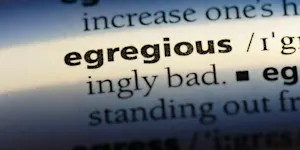What Makes This Word Tick
"Mercurial" is a word with a zing of unpredictability. It captures the spirit of the Roman god Mercury, who was known for being fleet-footed and capricious. A person, mood, or situation described as mercurial is often seen as lively and changeable—much like the weather in spring.
If Mercurial Were a Person…
Imagine a neighbor who one day plants tulips in every color imaginable, but the next day, turns the flowerbed into a vegetable garden overnight. This is someone who embodies a mercurial nature—full of surprises and quick shifts in passion and enthusiasm.
How This Word Has Changed Over Time
Initially, "mercurial" was closely related to those born under the planet Mercury, believed to create lively personalities. Over time, it evolved to describe someone who is volatile or unpredictable, not just lively. What began with astrology transformed into a common descriptor for the unpredictably engaging characters in our lives.
Old Sayings and Proverbs That Use Mercurial
While not frequently found in old sayings verbatim, anyone who has ever said, "Change is the only constant" would understand the essence of being mercurial. It is the kind of word that fits well into adages about the fickleness of human nature and the ever-changing winds of fortune.
Surprising Facts About Mercurial
Did you know "mercurial" shares a root with the word "medicine"? Mercury, in its liquid metal form, was once used in medicine and alchemy—both of which relied on transformation and change, core aspects of the word's meaning.
Out and About With This Word
You'll often stumble upon "mercurial" in settings where adaptability is key, such as workplaces that thrive on innovation. It’s a favorite in the tech industry, where change is constant and new ideas sprout at lightning speed.
Pop Culture Moments Where Mercurial Was Used
Madonna’s career is an iconic testament to mercurial transformation. From "Material Girl" to a cowgirl in "Music," her ability to reinvent herself keeps audiences guessing and fascinated, much like the very definition of mercurial.
The Word in Literature
You might find "mercurial" gracing the pages of a mystery novel where the protagonist's moods or actions are as unpredictable as the plot twists. It resonates in dynamic narratives, keeping readers on their toes with its fluidity.
Moments in History with Mercurial
Think of the Roaring Twenties—a time of drastic social change, jazz, and cultural dynamism. This era embodied the mercurial spirit as societal norms were turned topsy-turvy in the blink of a decade.
This Word Around the World
In Japanese, the word "kigō," which means "capricious" or "restless," captures the mercurial essence. Across cultures, this idea of unpredictability remains universally understood, transcending linguistic boundaries.
Where Does It Come From?
"Mercurial" finds its etymological roots in the Roman messenger god Mercury, who was also the guide of souls to the underworld. Known for his speed and eloquence, this god’s attributes directly influenced the modern usage of the word.
How People Misuse This Word
Some may mistakenly use "mercurial" to describe anything simply chaotic, when it is more about the smooth transition and unpredictable shifts, rather than sheer chaos. It’s a nuanced word best reserved for those charming unpredictabilities.
Words It’s Often Confused With
Capricious: While both imply changeability, "capricious" often suggests whimsical or erratic behavior.
Volatile: This implies instability, but leans more toward unpredictable explosiveness rather than the lively dynamic of "mercurial."
Flighty: Suggests irresponsibility and lack of focus, often with a frivolous connotation.
Additional Synonyms and Antonyms
Synonyms include: unpredictable, whimsical, changeable. Antonyms include: stable, steady, consistent.
Want to Try It Out in a Sentence?
Sure! "The mercurial author kept her readers on their toes, with each new novel bringing unexpected twists that captivated and surprised."
















